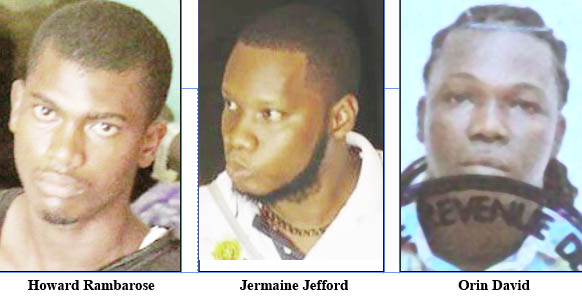One of the two men on trial for the 2016 murder of Laing Avenue taxi driver Orin David was acquitted yesterday after his attorney successfully presented a no-case submission.
Justice Sandil Kissoon moments later informed a visibly relieved Howard Rambarose that the state had failed to establish a prima facie case against him, and that he was resultantly discharged of the offence.
Upon the instructions of the trial judge, the jury was then directed to return a formal verdict of not guilty, thereby freeing Rambarose of the capital charge.
Ex-soldier Jermaine Jefford, however, remains indicted for murdering the taxi driver.
He is expected to know his fate on Monday when Justice Kissoon will sum up the case and hand it over to the jury to deliberate on a possible verdict.
The charge against Jefford, also known as ‘Smokey,’ is that he murdered David on August 1st, 2016, at Laing Avenue.
Leading his defence in unsworn testimony yesterday morning, Jefford professed his innocence as he argued that the charge levelled against him had been fabricated by the police.
He contended that the prosecution has “false evidence” against him and that his is a case of an innocent man being charged with an offence he knows absolutely nothing about.
He was adamant that he was at home on the day in question and that he had just been picked-up, arrested and charged by the police. “This is unfair! This is unfair to me!” he exclaimed in tears.
The accused said that he has no knowledge of the crime before or after its commission, and that there is evidence substantiating his position.
Jefford is being represented by Senior Counsel Stanley Moore. The prosecution’s case meanwhile is being led by state counsel Lisa Cave.
Meanwhile, on the case formerly levelled against Rambarose, defence attorney George Thomas submitted to the court in his no-case submission that there was no evidence that his client was present when David was killed.
His contention was that though his client was present with a number of other men during what he referred as the “first incident” — in reference to an argument they all had with the now dead man — there was no evidence that Rambarose had returned to the home of the deceased at the time he was shot and killed.
The lawyer further said that at the time David was killed by other men, there is no evidence to substantiate that his client was a part of any joint enterprise or common design intending to achieve such a result.
In fact, he submitted that the killing carried out by the perpetrators was an independent act on those persons’ behalf and that the prosecution could not prove otherwise, or even that his client killed, or intended to kill the deceased.
In the circumstances, he said that the prosecution could not be allowed to ask the jury to infer that Rambarose intended to kill or cause grievous bodily harm to David. “There is no such evidence,” Thomas said.
The attorney argued that the only agreement which the prosecution advanced that his client participated in was that of the verbal exchange; which he made clear involved no violence, attack, assault or use of any weapon.






